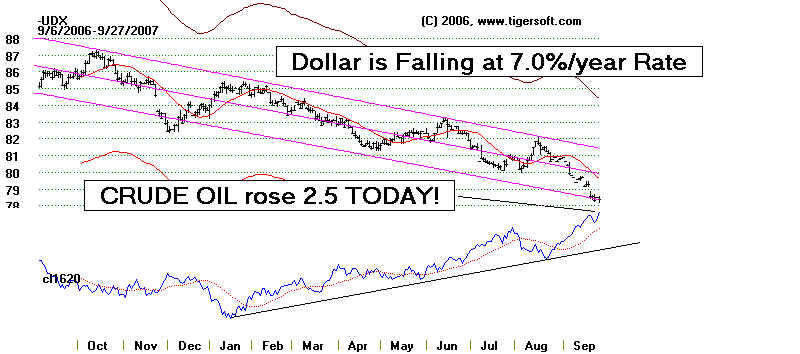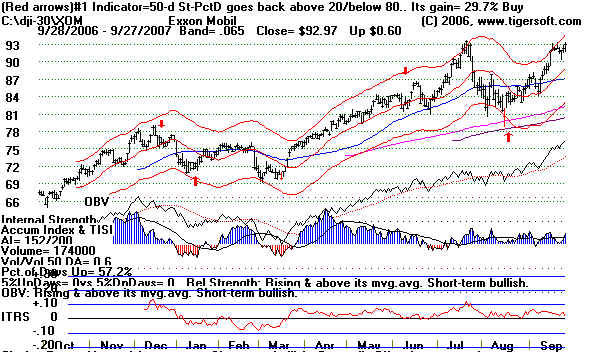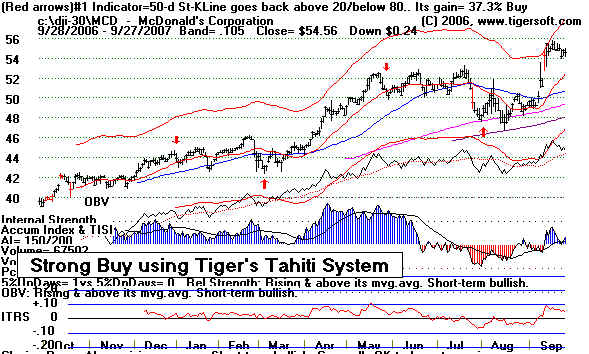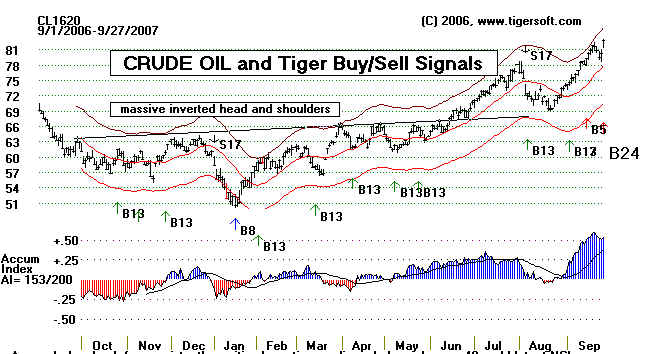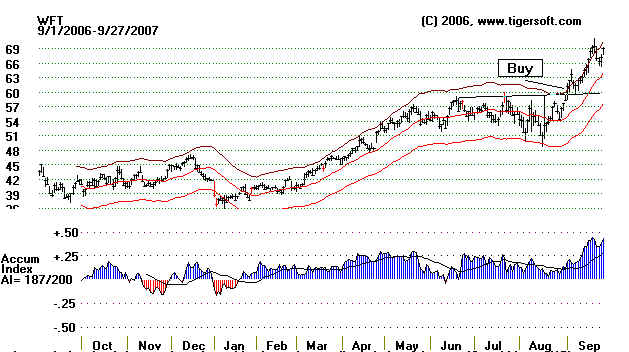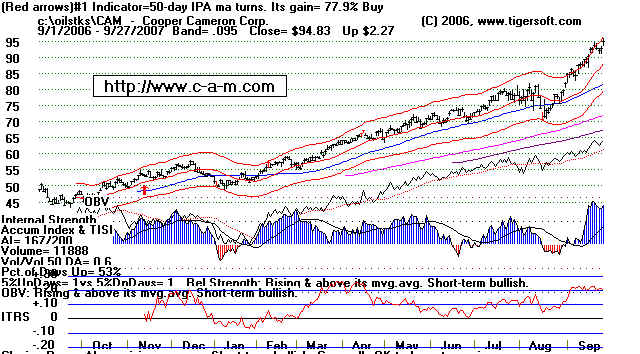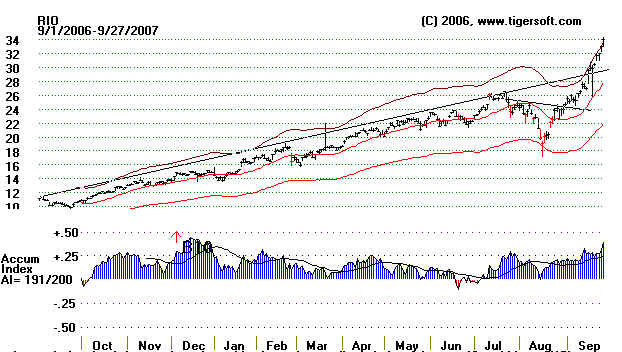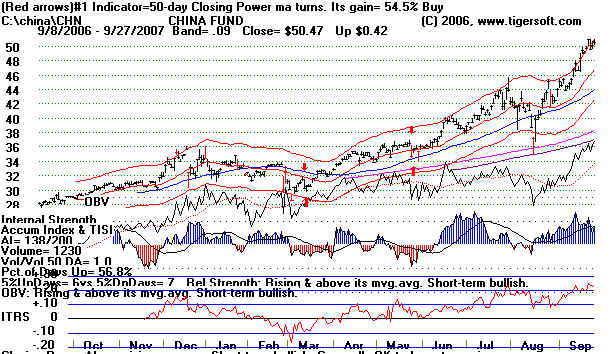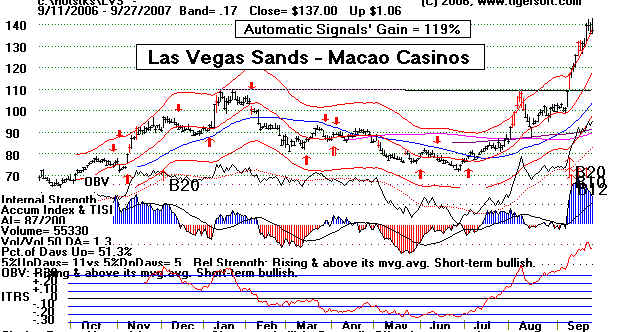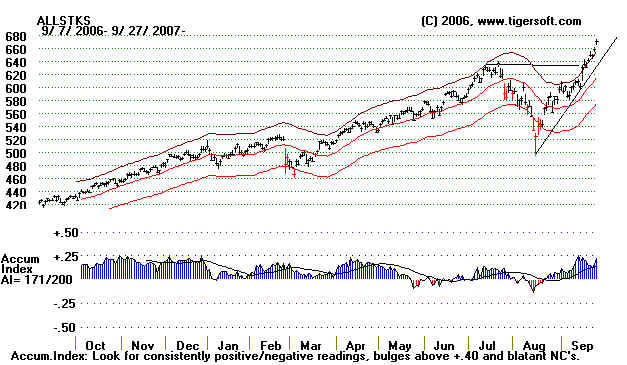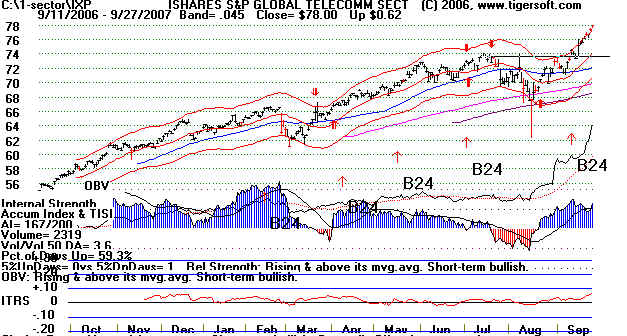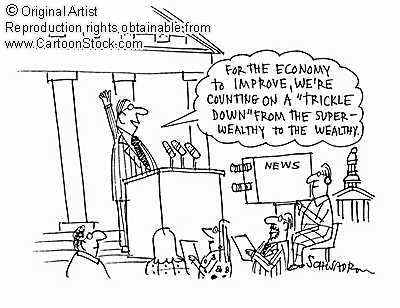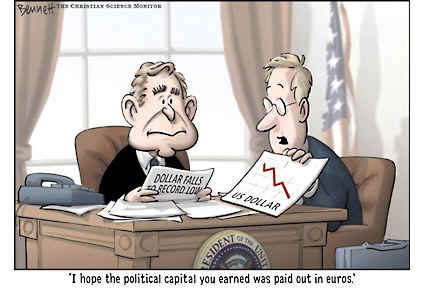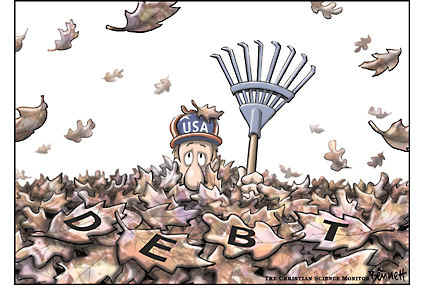 Tiger Software - Bill's Blog
9/27/2007 -- The Fed and
The Stock Market --
Tiger Software - Bill's Blog
9/27/2007 -- The Fed and
The Stock Market -- |
Daily
Blog - Tiger Software Fed Keeps Injecting Billions into Market Despite Dollar's Weakness Stocks To Buy When Fed Inflates CARTOONS to CRY BY.. ======================================= |
|
Tiger
Software - Helping Investors since 1981 Suggestions: Peerless Stock Market Timing: 1928-1966 Track Record of Major Peerless Signals Earlier Peerless-DJIA charts 7 Paths To Making 25+%/Yr. Using TigerSoft Index Options FOREX trading Investing Longer-Term Mutual Funds Speculative Stocks Swing Trading Day Trading Stock Options Commodity Trading |
Fed Keeps Injecting Billions into
Market 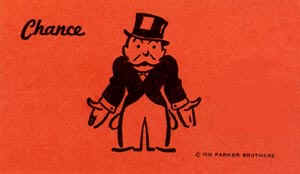 STOCKS to Buy When Fed INFLATES
STOCKS to Buy When Fed INFLATES
Econ text books tell us that the Fed, from time to time, typically
buys billions of dollars worth
of
securities from major banks, pumping extra cash into the banking system, which the banks
are
obliged to
repurchase at a later date. But which they can then loan out, if they wish, so
long as
they meet
their own reserve requirements.. Supposedly, the Fed does injects money in this way
when an
economic slow-down threatens. It reverses this operations when it considers
inflation
is too
great a risk.
Now we have a situation when Oil is running to new highs,
foreigners are starting to sell US
Treasury
securities on balance and Gold is rising, because it is trusted more than the Dollar.
Most text
books would say these are signs of inflation. Yet
the Fed is hewing an expansionary
monetary
policy, the exact opposite of what ECON text books might suggest is a normal
course of
action. It is doing this, at great risk to those on fixed incomes, to save
bankers
and
brokerages from the consequences of their lax loan policies of the last few years. Examples
are easy to
find. Think back just two years ago when you could buy a house or a condo for NO
MONEY DOWN!
This was a shell game. It was reminiscent of the 10% margin
requirements that
produced
the 1929 Crash and the Great Depression.
Things are not what they seem. Article
I, Section 8, Clause 5, of the United States Constitution provides
that Congress
shall have the power to coin money and regulate the value thereof and of any foreign
coins.
But that is not
the case. The Federal Reserve Act of 1913 has given that power to a semi-private
corporation,
registered in the
State of Delaware - the Federal Reserve Bank. At the time of its creation, the
Federal
Reserve started
printing a new currency, Federal Reserve notes, which were backed by gold. Now it is
only "good
faith" which backs the greenbacks.
In 1936, Congress became concerned and a bill was initiated to "to abolish the
practice of creating bank
deposits by
private groups upon fractional
reserves". The Congress wanted to withdraw from the banks the
right to issue
credit on fractional reserves, and leave the banks the right to issue credit on account of
actual
deposits,
which means that permanent money will be loaned not bank manufactured money. Money could
not be
created out of
nothing. The law was not passed. It was too much an affront to entrenched
banking
interests.
It is said that JFK wanted to end the whole Federal Reserve system. Kennedy
recognized before
he was slain -
the original deal in 1913 creating the Federal Reserve Bank had a simple back-out clause.
The bank
investors loaned the United States Government $1 billion to create its charter. The
back-out clause
still exists for
the United States to buy out the system for that $1 billion. (See: http://sonic.net/sentinel/naij2.html )
True to his word, Fed Chairman Ben
"Helicopter"<1> Bernanke has been busy printing
money
and increasing the
money supply. Beginning August 9, the Fed aggressively
used repos to add new
reserves. Until
today, the zenith of these operations was the week of August 9-15. The new
number is $38 billion!
Clearly they are worried about a run on the banks! Banks have loaned
too much money that is
not being paid back!
Since August 8th, the Fed
has injected some 200 billion dollars into the financial system. The
distressed US mortgage
market is just the tip of the ice berg, I suggest. American consumers are tapped
out. The Fed
typically tries to prevent a bear market until the next President takes office, especially
if
it he belongs to a
party other than the political party which appointed him. See my lengthy study of
the politics behinds
Fed Discount rate changes between 1955 and 2007.
http://www.tigersoft.com/Tiger-Blogs/8-18-2003/index.htm
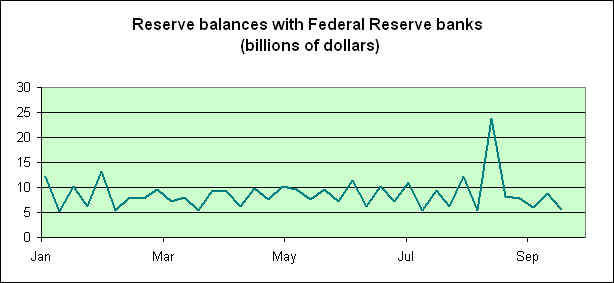
Source: http://209.85.165.104/search?q=cache:uTxBODOOudoJ:www.econbrowser.com/archives/2007/09/money_creation.html+added+reserves+Fed&hl=en&ct=clnk&cd=6&gl=us&client=firefox-a
)
2007
September
27 - The Federal Reserve added 38 billion
dollars in temporary reserves to the US money markets
Thursday in four separate operations to ease tight credit conditions.
September
9 The Fed added $5 billion
of temporary reserves to the banking system through 2-day
repurchase agreements.
September
6 Fed injects 31.25 billion
dollars into markets. The
Federal Reserve added 31.25 billion
dollars in temporary reserves to the US money markets Thursday in three different
operations, the latest move to keep credit markets from drying up. The New York Fed
added 7.0 billion dollars in 14-day repurchase agreements, 16 billion in seven-day
repurchase agreements and 8.25 billion in one-day repos.
August 27 Federal Reserve Bends the Rules for Citibank and Bank of America
One of the central tenets of banking regulation is that banks with federally insured
deposits should never be over-exposed to brokerage subsidiaries; indeed, for decades
financial institutions were legally required to keep the two units completely separate.
"In a clear sign that the credit crunch is still affecting the nation’s largest
financial
institutions, the Federal Reserve agreed this week to bend key banking regulations
to help out Citigroup and Bank of America." The regulations in
question effectively
limit a bank’s funding exposure to an affiliate to 10% of the bank’s capital.
But the
Fed has allowed Citibank and Bank of America to blow through that level. Citigroup
and Bank of America are able to lend up to $25 billion apiece under this exemption,
according to the Fed. If Citibank used the full amount, “that represents about 30%
of Citibank’s total regulatory capital, which is no small exemption,” says
Charlie
Peabody, banks analyst at Portales Partners.
(Source: www.crooksandliars.com/2007/08/27/federal-reserve-bends-the-rules-for-citibank-and-bank-of-america/
)
August 11
"The Federal Reserve injected $38 billion into the system in three increments
Friday, its
biggest one-day infusion since September 2001. The Fed sought to reassure investors by
releasing a statement before financial markets opened, saying it would provide as much
extra money as needed to hold its benchmark overnight interest rate at about 5.25
percent"
(Source: http://www.washingtonpost.com/wp-dyn/content/article/2007/08/10/AR2007081000689.html
)
------------------------------------------------------------------------------------------------------------------------------
<1> Bernanke wrote that he would have dropped greenbacks
from an airplane in the millions in the
early 1930's,
rather than follow the tight monetary policies of the times that he blames for lengthening
and,
possibly, even
starting the Great Depression.
WHAT TO DO WHEN
FED INFLATES US DOLLAR?
Tiger makes it easy to trade this market in these circumstances. We know the Fed's
printing money debases the dollar. So we are long those vehicles and stocks that rise in an era of
a sliding dollar. International American companies like those in the DJI do well because so much
of their earnings comes from overseas. And in the DJI-30 group, we always buy the highest
Accumulation stocks. Now those are XOM and MCD. Both are at their highs. Next we
buy gold. That is at its highs. We buy oil. Oil stocks and Gold stocks are making new highs
together. Lastly we buy foreign ETFs, especially China and foreign telecomms. These groups
of stocks are the best...
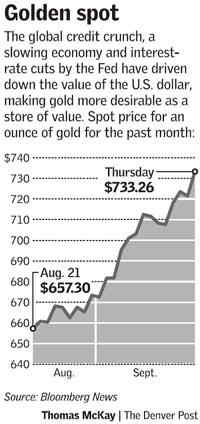
http://www.denverpost.com/business/ci_6952943
OUR CURRENT BUY LIST (Charts are shown below)
EURO
http://www.tigersoft.com/Tiger-Blogs/7-12-2007/index.htm
XOM and MCD in DJI-30
http://www.tigersoft.com/Tiger-Blogs/6-15-2007/index.htm
Gold and GOLD Stocks - XAU is up 25% in last month!
http://www.tigersoft.com/Tiger-Blogs/9-19-2007/index.html
Crude Oil and strongest high Accumulation Oil Stocks
http://www.tigersoft.com/Tiger-Blogs/7-23-2007/index.htm
CHN (China Fund), LVS (Las Vegas Sands - Macao casino is big.)
http://tigersoft.com/--3--/Best-stock-now-from-Tiger.htm
Foreign ETFs
http://www.tigersoft.com/Tiger-Blogs/6-18-2007/index.htm
Foreign Telecomms
